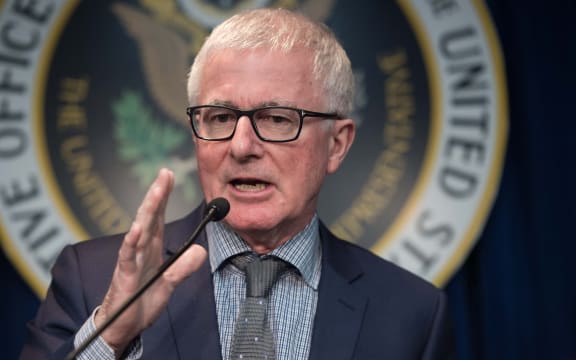Ministry figures show there are around 60 New Zealanders in prison or held captive overseas right now - what lifelines do they have back home?

Social media influencers Topher Richwhite and Bridget Thackwray spent nearly four months being detained in Iran before their release. Photo: Expeditionearth.live / Instagram
Back in late October, news broke that New Zealanders Topher Richwhite and Bridget Thackwray had been released from detention in Iran.
The social media influencers entered the country in July, but then their accounts went strangely silent.
New Zealand media got wind of the story, but were asked not to publish details of what had happened to the couple, as the government tried to negotiate their safe exit.
The case shone a spotlight on so-called "quiet diplomacy" - and the practical limits of consular assistance.
Figures from the Ministry of Foreign Affairs and Trade show there are about 60 New Zealanders who are either in prison or being held captive overseas.
Thirteen are detained in China, 12 are in prison in the United States. Others are being held in places like Indonesia, Thailand, the United Kingdom and Singapore.
Many have committed drug or fraud offences, while some have been jailed for murder.
Tim Groser, a former trade minister and ambassador to both Indonesia and the United States, puts it like this: "when you are travelling, you don't travel within the framework of New Zealand law, you travel within the law and conventions of the country you're travelling".
Groser says situations where New Zealanders get into serious trouble overseas are "awesomely difficult" for diplomats to manage.
"Every situation is unique. I know some people disparage the traditional response of most foreign ministries, which is to avoid publicity, try and work behind the scenes with the authorities.

Tim Groser Photo: AFP
"There's a very good reason for doing that, because if you send screaming headlines through the media, the government concerned may feel it would lose face or have its own system called into doubt if they make any concessions."
Craig Tuck is a Tauranga-based lawyer who specialises in transnational criminal justice and he has represented a number of New Zealanders who have been arrested overseas.
Prior to the pandemic, he would spend about a week a month overseas, dealing with these sorts of cases.
"Through the Covid period, everything just really did go on hold, and most of that work now is starting to kick off again with people who have been detained for some period now needing assistance."
Tuck says diplomats need to maintain country-to-country relationships in these sorts of situations, and this is at the front of their minds.
"Often it's the lawyer who can say things that point to a weak rule of law, a two-tiered rule of law, or that there are problems with the process and the judiciary.
"There are all sorts of cultural factors that go into decision-making overseas and it's for transnational defence lawyers and advocates to start pointing out what a fair trial is and what due process is."
When it comes to back-channel diplomatic negotiations, Groser says the government would work with both the foreign ministry of the country detaining the person, as well as the person's lawyers.
"It's a pretty logical approach you would follow while trying to reassure the authorities that you're not challenging their law, you were looking for some flexibility.
"What you'd be doing is slowly introducing into their equation political considerations about their bilateral relationship with New Zealand, because any legal system that you and I have ever heard of has got discretion."
Tuck says diplomacy can go horribly wrong when a government pushes back against another government, commenting on the criminal justice system or the aid that they're giving.
He points to the case of the Australian ringleaders of the Bali Nine, Andrew Chan and Myuran Sukumaran, who were executed in Indonesia in 2015, 10 years after they were arrested on drugs charges. In that situation, then-Australian Prime Minister Tony Abbott was seen by many to have over-reached in making comments about the bilateral relationship with Indonesia as he attempted to save the pair from the death penalty.
Tuck says there are some people he's represented who have side-stepped pretty significant terms of imprisonment overseas, while others are sitting for long periods in jail.
Find out how to listen and subscribe to The Detail here.
You can also stay up-to-date by liking us on Facebook or following us on Twitter.

Photo:


